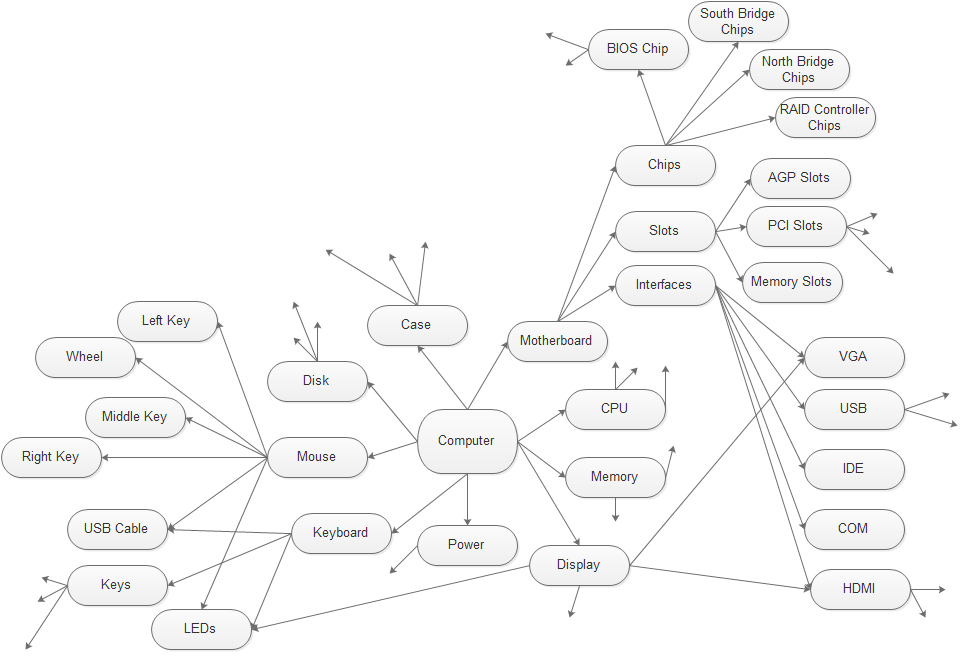A Real Problem
Suppose we need to use programming lanaguage to construct a computer:
- A computer is made of a lot of components
- Each component is make of a lot of sub-components
- Some sub-component may be shared by different component
- The shared sub-component may be assembed with different parameters in order to compse a component.

We first create mouse:
var leftKey = new LeftKey();
var middleKey = new MiddleKey();
var rightKey = new RightKey();
var wheel = new Wheel();
var cable = new UsbCable();
var led = new LED();
var mouse = new Mouse(leftKey, middleKey, rightKey, wheel, cable, led);
The create keyboard:
var keys = new Keys();
var led = new LED();
var cable = new UsbCable();
var keyboard = new Keyboard(keys, led, cable);
Then we can create other components cpu, mothboard, display, .etc, finally we assemble them into a computer:
var cpu = new CPU(...);
var motherboard = new Motherboard(...);
var memory = new Memory(...)
...
var computer = new Computer(cpu, motherboard, memory, mouse, keyboard, display, power, ...)
Actually, whenever you want to create computer, you have to manually all components, all sub compoents all sub-sub components ...
So whether we can create a smart factory, when I ask for a computer, it automatically finds all compoents, sub components and assemble them well, something like below:
var computer = smartFactory.generate('computer');
The di is just like the smart factory! Every component will have a unique name, we only need to create component and specify its sub-component (dependency), then we ask for di a component, we tell its unique name, the di can recursively resolve the dependency for us.
Create di Module in RackHD
- Standard way:
var di = require('di');
module.exports = analyzeOsRepoJobFactory;
di.annotate(analyzeOsRepoJobFactory, new di.Provide('Job.Os.Analyze.Repo'));
di.annotate(analyzeOsRepoJobFactory,
new di.Inject(
'Job.Base',
'Logger',
'Assert',
'Util',
'_',
'Promise',
'JobUtils.OsRepoTool'
)
);
- A simple way that customized by RackHD
module.exports = encryptionFactory;
encryptionFactory.$provide = 'Encryption';
encryptionFactory.$inject = [
'crypto',
'Constants',
'apache-crypt'
];
Register all di Modules
You only need to declare the di information for each module, when RackHD runs, it will scan all source files, and automatically register all modules.
var injectables = _.flattenDeep(
[
// NPM Packages
helper.simpleWrapper(_, '_'),
helper.requireWrapper('bluebird', 'Promise'),
helper.requireWrapper('rx', 'Rx'),
helper.requireWrapper('nconf'),
helper.requireWrapper('waterline', 'Waterline'),
...
// Glob Requirables
helper.requireGlob(__dirname + '/lib/common/*.js'),
helper.requireGlob(__dirname + '/lib/models/*.js'),
helper.requireGlob(__dirname + '/lib/protocol/*.js'),
helper.requireGlob(__dirname + '/lib/serializables/*.js'),
helper.requireGlob(__dirname + '/lib/services/*.js')
]
);
var injector = new di.Injector(injectables);
Then you could get a module simplify by:
var encryption = injector.get('Encryption');
var analyzeJob = injector.get('Job.Os.Analyze.Repo');
Two Types of Module
- Singleton
module.exports = configurationServiceFactory;
configurationServiceFactory.$provide = 'Services.Configuration';
configurationServiceFactory.$inject = [...]
function configurationServiceFactory(...)
{
function ConfigurationService() {
...
}
...
ConfigurationService.prototype.start = function start() {
...
};
return new ConfigurationService();
}
You could directly use it:
injector.get('Services.Configuration').start();
- Class
module.exports = encryptionFactory;
encryptionFactory.$provide = 'Encryption';
encryptionFactory.$inject = [...];
function encryptionFactory(...) {
function Encryption () {
}
Encryption.prototype.createHash = function (data, algorithm, salt) {
...
};
return Encryption;
}
Usually, you need to create an instance before using it:
var Encryption = injector.get('Encryption');
var encrypt = new Encryption();
encrypt.createHash();
Other di Characteristic
- Cache
- Some di helper functions